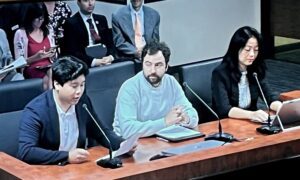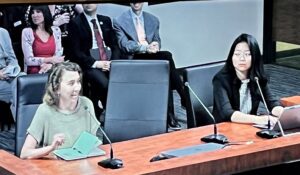By Cailyn Nagle
Two years after Governor Gavin Newsom called out the usurious textbook marketplace and included $115 million in his budget for Zero Textbook Cost (ZTC) degrees, it is time to take the pulse of California’s ZTC implementation. The infusion of support for the California Community Colleges (CCC) comes on the heels of a successful 2016 pilot program that delivered a 858% return on investment and improved student grades by up to 7.3 points.
On July 24th, the Office of the Chancellor unveiled exciting progress on the most recent phase of the ZTC Degree program during the CCC Board of Governors meeting. In addition to providing important updates on the rollout of the Zero Textbook Cost degree, the Board also previewed the upcoming recommendations from the Burden Free Instructional Materials Taskforce, which was convened by the Office of the Chancellor to address the full costs of materials needed for classes. We were thrilled to attend the meeting and are excited to share updates.

Allen Kuo, Textbook Affordability Fellow, delivers a public testimonial.
With representatives from faculty, classified employees, trustees, and the general public, the Board of Governors guides policy and provides guidance to the 116 CCC campuses across the state. The reports they receive from bodies within the system, including the Chancellor’s Office and other groups, inform policies they set and provide an important indicator for the system’s priorities and progress.
In her first meeting with the Board, Chancellor Sonya Christian introduced the agenda item by addressing the heart of the problem and the solution: At its core, if students cannot access the materials they need for class, they will not be able to succeed. Currently, students are having to make hard choices between basic necessities, such as food or transportation, and the instructional materials necessary to learn. For over a decade, the Community College has been on the forefront of the most sustainable and holistic solution to this crisis: open educational resources (OER).
After Dr. Christian’s introduction, the Chancellor’s office shared the next phases of the Zero Textbook Cost program, which will roll out next month. The updates shared by Vice Chancellor Rebecca Ruan-O’Shaughnessy and Dean James Glapa-Grossklag included:
- The upcoming phase of funding, which campuses will be receiving start next month
- Professional development opportunities around OER development and accessibility
- Data collection and evaluation by the RP group
- Implementation technology that facilitates collaboration and prevents duplication of efforts
Many of these measures, including the appointment of a technical advisor, are measures the Michelson 20MM Foundation has long advocated. We are thrilled to see the progress shared by the Office of the Chancellor and look forward to continuing to support the implementation of these programs.
Instructional material access goes beyond textbooks, students also need everything from lab coats and goggles to hair shears and kitchen knives. A cosmetology kit can run up to $850, which is equivalent to around three months of grocery bills. The Burden Free Instructional Materials Taskforce spent the last year creating a set of recommendations that will allow campuses to begin addressing this often overlooked barrier. While the official recommendations will be shared in late September, the initial preview included leveraging the buying power of the 116 campuses, ongoing advocacy, and professional development and technical support.

Cailyn Nagle shares public comment at the Board of Governors meeting.
The agenda item closed out with a resolution from Trustee Joseph Williams, which committed the Board to strengthen students’ ability to obtain the necessary materials for courses ahead of term and at no cost, to study the Burden Free Instructional Materials Taskforce Recommendations, to prioritize sustained OER support infrastructure, and to direct the Chancellor’s Office to work in partnership with the Academic Senate and others with the goal of supplying the Board with recommendations to build on the Zero Textbook Cost program. The resolution passed unanimously.
We are excited to see the Board’s prioritization of ZTC efforts and look forward to continuing to see and advocate for a successful and sustainable implementation of Governor Newsom’s funding.
Michelson 20MM is a private, nonprofit foundation working toward equity for underserved and historically underrepresented communities by expanding access to educational and employment opportunities, increasing affordability of educational programs, and ensuring the necessary supports are in place for individuals to thrive. To do so, we work in the following verticals: Digital Equity, Intellectual Property, Smart Justice, Student Basic Needs, and Open Educational Resources (OER). Co-chaired and funded by Alya and Gary Michelson, Michelson 20MM is part of the Michelson Philanthropies network of foundations.
To sign up for our newsletter, click here.
